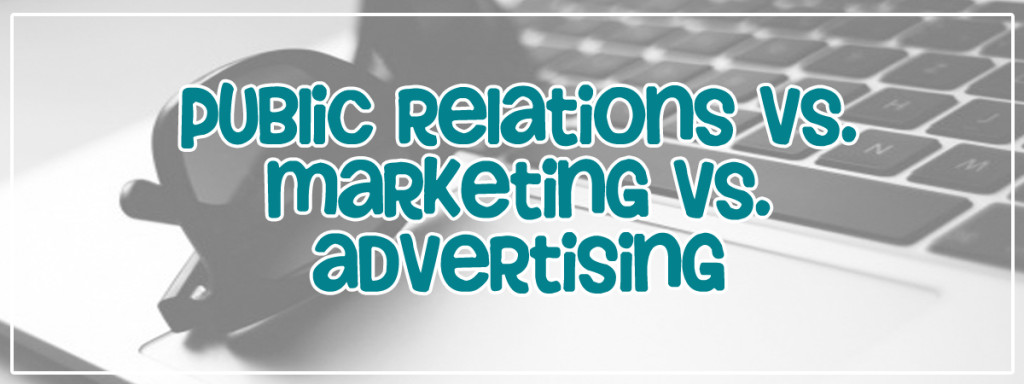Public relations vs. marketing vs. advertising. It’s an old, tiring discussion. I’m asked about it often. Especially since often times, though I practice public relations, I report to a VP or Senior VP of marketing. “FOR THE LOVE OF ALL THAT IS HOLY, AJ, WHAT IS THE DIFFERENCE BETWEEN MARKETING AND PR?”
Ok, maybe I’m not asked precisely like that. But I know how to read through the lines.
There is definitely a difference but it’s still a fair question. And I find that typically, when a person starts explaining marketing, questions about advertising follow. And there they are. These three mysteries of business. Public relations, marketing and advertising.
The goal of all three is really the same. They are all geared to generate engagement, drive brand awareness and more often than not, generate revenue. They are all things you strategize, develop, execute and analyze. I personally find all three require partnerships and supporters; a tribe of colleagues. Sometimes I find practicing PR alone is super stressful and lonely — who wants that? So yes, a tribe. Preferably one smarter and wiser than I am.
All three require results. Otherwise, what’s the point?
PUBLIC RELATIONS
Some might agree that of the three amigos, PR is the hardest to prove value for. Why? Because it deals primarily in earned media. And what does that mean? “Earned media” refers to publicity gained through efforts that do not cost money. In short, as a publicist, I pitched you my idea, my story, my angle and you — “you” being press, blogger or influencer — provided coverage in some form or another without receiving any financial compensation. I earned your attention. (P.S. Bloggers, this is also why when you ask a publicist if they have budget for a sponsored post, a lot of the time they’ll say they do not. Maybe it’s smarter to ask if there’s a marketing budget…)
But I can’t really put a finite value on what I’ve done nor can I provide a finite revenue stream as a result of my efforts. It’s a little hard to swallow for some. It’s become a little easier, mind you, now that we can track links and follow people around who shop online. But who’s to say that if I get a reporter to review a movie I’m working on that his favorable review directly impacted ticket sales at the local theater? We continue on, though, because when all is said and done, it’s a very safe assumption. Because here’s what we can do: We bring the awareness. We craft an image, improve an image or repair an image. We can read the comments, the social media, and make real-time changes because a lot of the time, we don’t have to wait for budget approvals… we can plan events and run red carpets and follow the coverage… we can develop meaningful relationships with media and phone in favors. We can totally tell you the best person to pitch that random line of toe-socks at the Cleveland Plain Dealer because you remember this time you pitched them this story about an actor who…. Never mind. We just know a lot of random shit.
Here’s when the lines have blurred. Because as it turns out, some publicists have come to wear many hats. And often times, though we practice publicity, we dip our toes in marketing. We do sometimes pay bloggers for sponsored content. We talk to brands about partnerships and product placements that sometimes cost money. We pay for a block of advertising so that a talk show host gives our product away on air to the whole audience. Some might call this marketing. I’d agree with them….
Marketing
Marketing includes a lot of financial components and is probably a little more measurable. At the very least, when I can’t tell you results, I can tell you what the exposure is valued at. But nothing is clear cut here either. “Marketing” means a lot of things. It means traditional marketing, digital marketing, social media marketing, inbound marketing, content marketing, email marketing… I could write a single post on marketing alone but I honestly don’t know enough about it, nor do I have the patience. I have the utmost respect for marketers. Marketing serves to educate the public so not only do you know about the product, now you also want to go buy it. (And you might say my job is to keep you wanting it. PR is a much more long-term endeavor.)
Marketing is also, I believe, the originator of owned media. What is that? It is media that you own internally. More often than not it’s media you create — or, at the very least, supervise the creation of. Your assets, your collateral. Your website, your graphics, your video, your social media channels. Marketing is not the singular controller of owned media anymore, but it starts here.
There may be a little more analysis and data capture in marketing. Before you can get to PR, the marketing team is likely responsible for identifying a product’s target customer, researching the market and setting a budget for launch. They’re the consummate middle-man because their information directs public relations and advertising. Marketers also have to be psychics. Because you can’t afford to run out of customers — you have to be able to identify who your future clients are as well.
A lot of folks will also tell you that marketing is proactive while PR is reactive. I think that can be true but I’m not convinced it’s a universal truth.
And dare I add, leaning back on the final bit from above under public relations, that marketing works in paid media as well. Have you ever heard someone say “marketing spend?” When you see Ellen handing out watches to her audience, while lovely, she’s not doing it out of the kindness of her heart. There’s a marketing spend behind it.
But isn’t that advertising? Well…. yes. A little. (Did I mention blurred lines?)
Advertising
Maybe this is the easy one because you probably know advertising when you see it. Commercials, billboards, print ads, posters, postcards, pamphlets, brochures… It’s the method of persuading your targeted audience to buy something. Advertising is 100% paid media. I give a platform or outlet X amount of money, they post my ad, and I know X amount of people are going to see it and for precisely how long a period of time. There are a few more certain variables at play here.
What isn’t certain? The perception. Once that ad is out there, it’s out there. So this is when marketers and publicists come in handy. It’s not enough to put a billboard up. Sometimes you have to shape the way people see it. Sometimes you need to find a celebrity to endorse your product and be on said billboard. Sometimes the market tells you your ad isn’t working and it’s back to the drawing board you go. Sometimes the conversation on social media is that the billboard is hugely offensive…
 You see how this is going. No team is an island.
You see how this is going. No team is an island.
Do you know why Louis Vuitton can charge thousands of dollars for a purse? It’s not just the materials, folks. It’s because a marketer identified who would pay for it, an advertiser put an ad where that audience would see it, and a publicist makes sure the public perception is that this is a high end bag only the most wealthy and classy people carry.
So, have I answered any questions or created more of them?
In the end, with all these intricacies, similarities and differences, the over-arching point is that you do whatever you can to act in the best interest of your client/company/brand/etc. And if all that doesn’t clear it up, I sometimes like to put it this way. Advertising makes you aware of a product. Marketing makes you want the product. Public relations makes you believe you need the product. As the old saying goes, “Advertising is what you PAY for, publicity is what you PRAY for.”
Go out and buy something you need. I’ll be praying you do and I bet It’ll make you feel good. 😉







[…] I broke down public relations, marketing and adveritsing […]